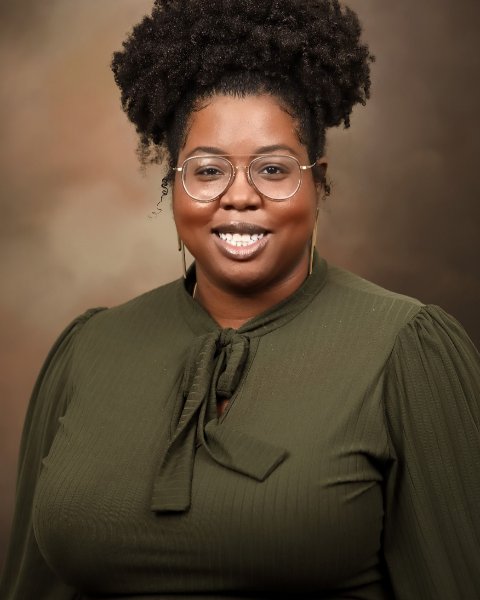Student outcomes
Lightning Talk
Embedded Engagement: Expanding Access to Service Learning for Student-Athletes
Thursday, October 26, 2023
8:00 AM - 9:15 AM CST
Location: Korach

Lauren A. Shinholster, MPH (she/her/hers)
Associate Director of Engaged Learning
Mercer University Center for Engaged Learning
Macon, Georgia, United States
Presenter(s)
Abstract: Since spring 2017, student-athletes enrolled in Mercer University’s LSK 186, a college study skills course, have participated in required service learning. Service-learning experiences have ranged from school-based tutoring and mentorship programs to indirect service projects such as read-aloud videos and marine debris tracking.
This lightning talk will provide strategies for increasing access to service-learning and high-impact practices for student-athletes. The presentation will offer insights into the collaboration between Mercer Athletics and the Center for Engaged Learning and will discuss the benefits and challenges of embedding service-learning engagement in a highly individualized course.
Narrative: Participation in high-impact practices (HIPs) such as study abroad, internships, and undergraduate research is known to benefit student learning and retention (Kuh, 2008). However, engagement in HIPs for student-athletes can be incredibly challenging. From practice to game day and from the classroom to the weight room, student-athletes are juggling their time. So, where does service learning fit in?
The proposed lightning talk will explore the benefits and challenges of embedding service-learning engagement in a required first-year course for student-athletes. Since spring 2017, Mercer University athletes enrolled in LSK 186, a college study skills course, have participated in required service learning. This practice has been pivotal for increasing access to high-impact practices for student-athletes. Furthermore, the integration of service learning into LSK 186 has been instrumental in ensuring that students in the College of Liberal Arts and Sciences can satisfy their Experiential Learning requirements.
Each spring semester, approximately 130 athletes enroll in LSK 186. Recognizing that barriers to engaging in HIPS will often vary based on sport and competition season, the implementation of the service-learning experience requires intentional collaboration that reflects the shared commitments of Mercer Athletics, the Center for Engaged Learning, and our students and community partners. The lightning talk will highlight the LSK 186 service-learning planning and implementation strategies, including project selection, pre-service training, and critical reflection.
This lightning talk aligns well with the overall conference theme of redefining research, access, and inclusion in service learning. Adopting an equity-centered approach to service learning is necessary if we want our athletes to lead on and off the field. Participants in this lightning talk will be able to build on the insights shared from Mercer’s Center Engaged Learning while considering their own campus climates and commitment to service and civic engagement. Important considerations include the student and community partner’s voice in project selection, time and transportation constraints, and parity of service experiences.
This lightning talk will provide strategies for increasing access to service-learning and high-impact practices for student-athletes. The presentation will offer insights into the collaboration between Mercer Athletics and the Center for Engaged Learning and will discuss the benefits and challenges of embedding service-learning engagement in a highly individualized course.
Narrative: Participation in high-impact practices (HIPs) such as study abroad, internships, and undergraduate research is known to benefit student learning and retention (Kuh, 2008). However, engagement in HIPs for student-athletes can be incredibly challenging. From practice to game day and from the classroom to the weight room, student-athletes are juggling their time. So, where does service learning fit in?
The proposed lightning talk will explore the benefits and challenges of embedding service-learning engagement in a required first-year course for student-athletes. Since spring 2017, Mercer University athletes enrolled in LSK 186, a college study skills course, have participated in required service learning. This practice has been pivotal for increasing access to high-impact practices for student-athletes. Furthermore, the integration of service learning into LSK 186 has been instrumental in ensuring that students in the College of Liberal Arts and Sciences can satisfy their Experiential Learning requirements.
Each spring semester, approximately 130 athletes enroll in LSK 186. Recognizing that barriers to engaging in HIPS will often vary based on sport and competition season, the implementation of the service-learning experience requires intentional collaboration that reflects the shared commitments of Mercer Athletics, the Center for Engaged Learning, and our students and community partners. The lightning talk will highlight the LSK 186 service-learning planning and implementation strategies, including project selection, pre-service training, and critical reflection.
This lightning talk aligns well with the overall conference theme of redefining research, access, and inclusion in service learning. Adopting an equity-centered approach to service learning is necessary if we want our athletes to lead on and off the field. Participants in this lightning talk will be able to build on the insights shared from Mercer’s Center Engaged Learning while considering their own campus climates and commitment to service and civic engagement. Important considerations include the student and community partner’s voice in project selection, time and transportation constraints, and parity of service experiences.

